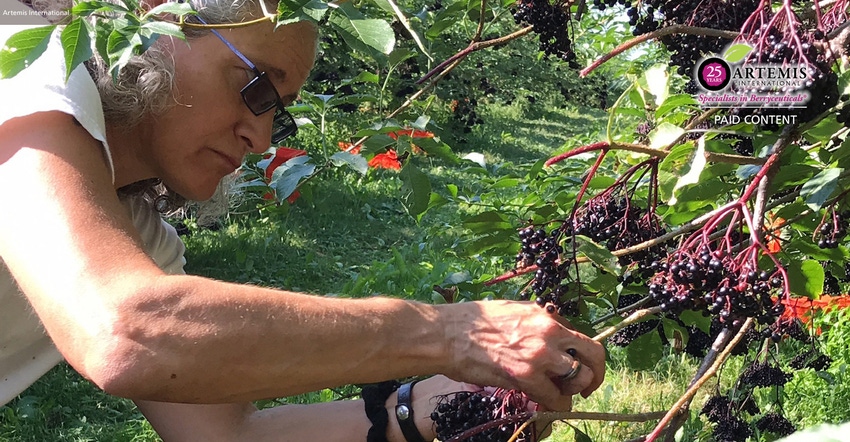Elderberry—long the go-to ingredient for seasonal immune support—is now a year-round industry superstar. How has the market changed and what lies ahead?
March 1, 2022

Sponsored by Artemis International
The State of Elderberry Today
Throughout 2020 and 2021, immune system support was an enormous health concern. Given that elderberry is well-known in this category suddenly everybody jumped on the elderberry bandwagon.
Very quickly, the number of products on the market—both finished products and ingredients—sky-rocketed. Some were straight-up opportunistic and we’re starting to see many of those products drop from the marketplace.
However, in that very same timeframe, many established and well-known brands decided to double down on elderberry, augmenting their existing lines by boosting production and moving forward with developing new products. The strategic goal was clear: to make the most of heightened consumer interest and awareness by offering new products and some unique delivery systems.
In terms of consumption, gummies remain the consistent crowd-pleaser. But stick packs, liposomals, sparkling waters, fermentation, confections, chewing gum and others have joined them as viable options. (It is worth noting that awareness is growing around the significant benefit of elderberry absorption via oral membranes.) These marketplace additions are opening a robust dialogue about new delivery systems and the role they may play in the industry as time goes on.
The Bad with the Good
Along with the multiple upsides around elderberry’s popularity, comes a darker side. When unexpected increased demand met supply chain issues, the foundation was laid for lower quality material and finished products with questionable claims. Worse yet was a complete lack of clinical substantiation.
Until recently, there were only a small handful of reputable elderberry suppliers. Along comes a pandemic, and suddenly there were new suppliers both overseas and domestically, and an abundance of largely unsubstantiated and questionable products. On the heels of a particularly ill-timed poor harvest the prior year, brands were desperate for material.
Opportunistic suppliers flooded potential buyers’ inboxes with offers of “extracts” for impossibly low prices. Completely farfetched claims of fruit equivalence, or what we call “ratios” in the industry—have become the norm. Consider some basic math: How could a 10:1 Elderberry extract possibly be 10kgs of elderberry to 1kg of finished extract, be processed overseas, and sell for $10-$15/kg? It does not add up. Domestically, some making high ratio claims and juice equivalencies are dubious when it comes down to numbers.
Artemis has been a proud partner in our industry’s anti-adulteration initiative, and within this program, many ingredients and finished product samples were tested via independent lab analysis. It was determined that—no surprises here—a substantial number didn’t quite measure up to their marketing claims. Final testing results revealed a range from “no elderberry present” to “elderberry with non-elderberry compounds.”
Who loses in the end? Consumers, who purchase gummies or other products that include ingredients that are not clinically substantiated and therefore very likely not providing the desired health benefit. The climate pendulum swung in a positive direction for elderberry and this past harvest was a great one. We now have plenty of high-quality material available ensuring that it’s well within reach to formulate with ingredients that actually perform for consumers.
Formulating Best Practices
Two years post COVID declaration, there is finally more of a collective sense that new normals are within reach. This critical moment in time presents an important opportunity to take a step back and review what matters—or at least, should matter—when formulating elderberry into a product. Essential questions to ask include:
Is it European Sambucus nigra, which is the exact species that has been clinically studied for its immune health benefits?
What is the origin of the material? Can this be proven?
How was the extract produced, via what specific methodology?
What are the sustainability practices of the manufacturer?
Selecting ingredients is serious business. Thorough research is all-important. We hear from our customers regularly how difficult it is to gather reliable information. That’s when the customer-supplier relationship is even more indispensable. For anyone looking to learn more about Elderberry and the possibilities for formulating with it, our comprehensive Elderberry Guide is available for download. Artemis is available to answer any questions—just send an email to [email protected] or call us at (260) 436-6899.
You May Also Like




.png?width=800&auto=webp&quality=80&disable=upscale)